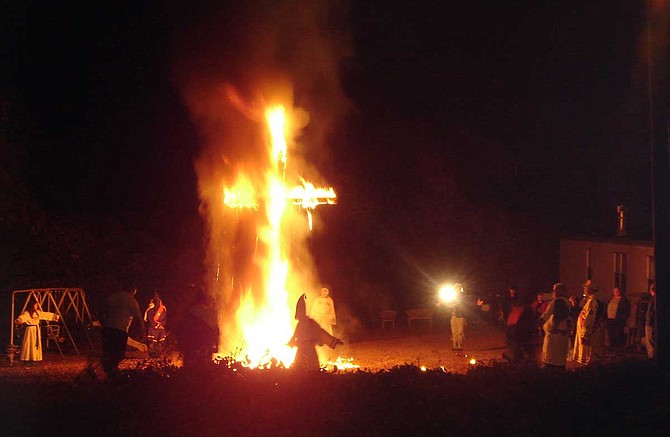Cross burnings, like this one at an unidentified location in 2005, are less common than they were in the Jim Crow era, but remain staples of private Klu Klux Klan gatherings. People still sometimes use them to intimidate and harass African Americans. Photo courtesy Wikimedia Commons
JACKSON — A Mississippi man who burned a cross in a predominantly African American neighborhood in Covington County pled guilty to federal charges on Friday.
On Oct. 24, 2017, Louie Bernard Revette and an unnamed co-conspirator constructed a wooden cross at the home of a juvenile victim in Seminary, Miss., using materials at or near the residence. They then erected the cross near the home and set it on fire.
In court on Apr. 12, Revette, who accepted a plea deal, admitted to the cross-burning, and confessed that he did it to intimidate and frighten the neighborhood's black residents because he knew the area had a history of cross-burnings.
"Terrorizing our neighbors and entire communities based on race is a federal crime that will be vigorously prosecuted by this office," U.S. Attorney Mike Hurst, who represents the Southern District of Mississippi, said in a U.S. Justice Department press release on Friday. "I applaud our law enforcement for quickly investigating and bringing this defendant to justice. There is no place in our state or our country for this type of hatred, and we will not tolerate individuals making others live in fear because of the color of their skin."
Revette's charges include one count of interference with housing rights, which is a federal civil-rights violation, and one count of using fire while committing a federal felony. He could face up to 20 years in prison and a $500,000 fine.
"While wounds are still healing from Mississippi's past, incidents such as this only serve as setbacks and should be fully condemned in every community," said Mississippi FBI Special Agent in Charge Christopher Freeze. "The FBI stands firm that those who commit these reprehensible crimes will be aggressively investigated and prosecuted."
Like his victim, Revette is from Seminary. The Justice Department only identified the victim as "M.H.," and did not identify the co-conspirator.
In the past, white supremacists and organizations like the Ku Klux Klan in Mississippi commonly burned crosses to intimidate and harass black Mississippians. On a single night in Vicksburg in 1964 at the height of the Civil Rights Movement, for instance, klansmen burned crosses at six different residences, and one at the Vicksburg National Military Park—which memorializes the Battle of Vicksburg between Confederate and Union armies in the Civil War.
Though less common than they once were, cross-burnings have continued in Mississippi in the decades after the Civil Rights Movement. In June 1995, Valerie Bradley was still reeling from finding a cross burning outside her home just days earlier when two white youth arrived at her door and confessed at their parents' urging.
"They were literally in tears saying how sorry they were and said they didn't realize how serious what they did was," Bradley recalled in an interview with the Associated Press at the time. "They also admitted to burning another cross at a black family's home in Jackson in May."
In 1994, the Southern District charged two south Mississippi men after they burned a cross at the home of an interracial couple in Walthall County. In 2006, police arrested a white 16-year-old in Marshall County after he burned a cross at a black family's home.
In 1998, a white Virginia man burned a cross in a black neighbor's yard. Separately in Virginia that same year, two klansmen burned a cross at a Klan rally on private property. Prosecutors charged the men in both incidents under a Virginia law that prohibits cross-burning. With the help of free-speech attorney Rodney Smolla, the three men came together and filed a lawsuit, arguing that cross-burning was constitutionally protected free speech akin to flag-burning.
The case made its way to the U.S. Supreme Court, where Justice Clarence Thomas, the court's only African American member, questioned those claims.
"My fear is that there is no other purpose to the cross," Thomas said. "There was no communication, no particular message. It was intended to cause fear and terrorize a population."
Conservative Justice Antonin Scalia, who died in 2016, offered a suggestion: "Surely, one can burn a cross in the sanctity of one's bedroom."
The court found cross-burning illegal when done with an intent to intimidate, but not in all cases. For example, one justice noted, the state could not outlaw cross-burning on a film set as part of a production.
Thomas, despite his tough stance during oral arguments, dissented.
Last week, authorities in St. Landry Parish, La., charged a local deputy's son for setting fire to three historically black churches over a period of just 10 days. Each church was more than 100 years old. Like cross-burning, church-burning recalls the years of white supremacist terror and Jim Crow that followed the end of the Civil War.
Follow state reporter Ashton Pittman on Twitter @ashtonpittman. Send tips to [email protected].
More like this story
More stories by this author
- Governor Attempts to Ban Mississippi Abortions, Citing Need to Preserve PPE
- Rep. Palazzo: Rural Hospitals ‘On Brink’ of ‘Collapse,’ Need Relief Amid Pandemic
- Two Mississippi Congressmen Skip Vote on COVID-19 Emergency Response Bill
- 'Do Not Go to Church': Three Forrest County Coronavirus Cases Bring Warnings
- 'An Abortion Desert': Mississippi Women May Feel Effect of Louisiana Case


